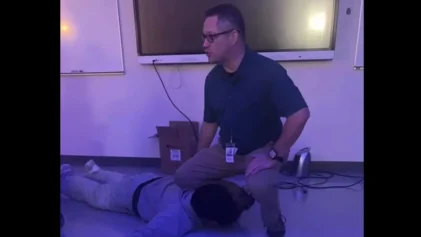A federal judge granted lawyers for Derek Chauvin permission to have tissue samples from George Floyd‘s heart and other body fluids tested in order to pursue an expert witness theory that Floyd died of a heart condition, not asphyxiation from Chauvin kneeling on the 46-year-old Black man’s neck for nine and a half minutes.
In his bid for a new trial, the former Minneapolis police officer argues that Eric Nelson, the attorney who represented him in his federal trial for violating Floyd’s civil rights, provided ineffective assistance of counsel by ignoring communications prior to his December 2021 guilty plea from Dr. William Schaetzel, a forensic pathologist.

Schaetzel had independently reviewed Floyd’s autopsy report and was convinced that Floyd had died from complications from a paraganglioma tumor that had secreted excessive levels of adrenaline, causing a fatal heart attack.
In his motion filed on Dec. 13, Chauvin, who is serving a 20.5-year sentence on the federal charges, sought permission to examine evidence including heart tissue and fluid samples that he argues could validate the alternate theory on Floyd’s primary cause of death.
In a previous filing in November, Chauvin said that had he known about Schaetzel and his forensic conclusions, he would not have pled guilty and would have insisted on going to trial.
On Monday U.S. District Court Judge Paul Magnuson wrote that “given that the discovery that Mr. Chauvin seeks could support Dr. Schaetzel’s opinion of how Mr. Floyd died, the Court finds that there is good cause to allow Mr. Chauvin to take the discovery that he seeks.”
The judge ordered the Hennepin County Medical Examiner’s Office to allow Chauvin’s new counsel to obtain and examine samples of Floyd’s heart, blood, and urine as well as photographs of his heart the office has retained since his autopsy in 2020.
At Chauvin’s murder trial in state court in April of 2021, Hennepin County Chief Medical Examiner Andrew Baker testified that the three police officers’ restraint of Floyd on the street caused his death. He said Floyd’s heart disease and drug use were contributing causes, but not direct causes.
Defense witness Dr. David Fowler, Maryland’s retired chief medical examiner, testified that Floyd died of sudden cardiac arrest due to heart disease while being restrained by the officers, and deemed the fentanyl and methamphetamine found in Floyd’s system “contributory conditions,” along with the paraganglioma tumor discovered during his autopsy. He said he could not rule Floyd’s death a homicide.
In response to Chauvin’s latest appeal, federal prosecutors argued in court filings that Nelson made a reasonable “tactical decision” not to explore an untested, unsolicited opinion “offered by someone holding himself out as an expert,” reported AP News. They noted that Nelson consulted with other medical experts in preparation for Chauvin’s cases, one of whom testified in the state case, but that the jury in that case rejected Chauvin’s medical defense.
Chauvin was convicted of murder and is serving a 22.5-year sentence on the state charges, which run concurrent with his federal sentence.
Public opinion about the case seems as polarized as it was in the days and weeks after Floyd’s shocking death, which incited protests and civil unrest about excessive force and racism among police and in the justice system, and calls for policing reform across the country.
On Monday, civil rights attorney Ben Crump commented on X about Judge Magnuson’s ruling to allow Floyd’s heart tissue to be tested that, “Nothing changes what we all watched: His knee on George Floyd’s neck for 9 minutes and 29 seconds.”
Crump’s post promoted thousands of responses, many reviving past arguments that Floyd died from a drug overdose and other health problems exacerbated by stress, and not from a knee on the neck.
“We know the truth! George Floyd was a drug addict who died of fentanyl poisoning,” wrote Patriotmom717 in response to Crump’s tweet.
Another added, “Chauvin didn’t kill Floyd. Floyd killed Floyd. Scumbags like you just tried to blame a white guy out of ignorance and hatred.”
On Instagram, some people responding to BallerAlert’s post about the judge’s order didn’t see the point of testing Floyd’s tissues.
“FOR WHAT!!!!!! That will prove nothing!!! The cop murdered him plain and simple!!!” wrote @garlooo_, while @the.simbonb noted, [Chauvin] caused the stress and trauma. Which ultimately lead to his death. So this just makes him guilty again.”
Others saw in the recent jury acquittal of Daniel Penny, whose vigilante justice via chokehold caused the death by asphyxiation of Jordan Neely on a New York City subway in 2023, justification to pardon Chauvin.
Others were less resolute.
On Tuesday MsChievousTruth wrote on X, “Many things can be true at once. I remember watching the George Floyd tapes and being horrified by Chauvin and his complete and utter lack of humanity when people were screaming for him to help Floyd. Floyd may have absolutely died because of the drugs in his system, or a heart condition but it doesn’t change Chauvin’s lack of humanity. I will never forget the look on his face.”
Chauvin is currently serving time in federal prison in Big Spring, Texas, where he was moved after suffering 22 stab wounds from another inmate in Arizona last November. The attack came days after the Supreme Court declined to consider appeal of his murder conviction in state court, reported The National Review.
If Chauvin’s federal conviction was overturned in federal court or by a presidential pardon, he would still likely have to serve the rest of his state sentence.
Democratic Minnesota Gov. Tim Walz is not likely to grant a state pardon to Chauvin, and Minnesota’s attorney general Keith Ellison, who led his prosecution for murder, has written a book about the case in which he compared Chauvin to Nazis, calling him a “bad cop” who “acted monstrously.”


